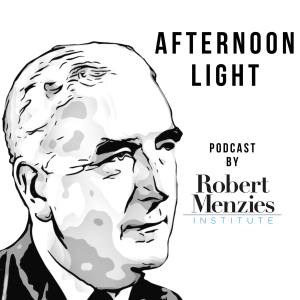
Wednesday Sep 06, 2023
Karl Schmude, ‘Transcended his time’ G.K. Chesterton
Have you heard of G.K. Chesterton? One of the most prolific authors of the early 20th century, Chesterton has recently been experiencing a revival. With humorous, inciteful, and even prophetic views on ‘everything’ - including politics, religion, the press, economics and more, it is easy to see why. Chesterton was one of Menzies’s many favourite authors, whom he used to refer to as ‘that laughing philosopher’. There’s even an Australian Chesterton Society.
Who is G.K. Chesterton? Find out more here
Fascinated by Chesterton? Buy tickets to this year’s Chesterton Conference at Campion College Sydney
Bonus Fact:
Menzies quoted extensively from Chesterton to explain ‘The Place of a University in a Modern Community’, in an important speech he delivered as Prime Minister in 1939: ‘The whole point of education is that it should give a man abstract and eternal standards, by which he can judge material and fugitive conditions. If the citizen is to be a reformer, he must start with some ideal which he does not obtain merely by gazing reverently at the unreformed institutions. And if anyone asks, as so many are asking: “What is the use of my son learning all about ancient Athens and remote China and medieval guilds and monasteries, and all sorts of dead or distant things, when he is going to be a superior scientific plumber in Pimlico?” the answer is obvious enough. “The use of it is that he may have some power of comparison, which will not only prevent him from supposing that Pimlico covers the whole planet, but also enable him, while doing full credit to the beauties and virtues of Pimlico, to point out that, here and there, as revealed by alternative experiments, even Pimlico may conceal somewhere a defect.”...
Anyhow, that is what is the matter with Business Education; that it narrows the mind; whereas the whole object of education is to broaden the mind; and especially to broaden it so as to enable it to criticize and condemn such narrowness. Everybody ought to learn first a general view of the history of man, of the nature of man, and (as I, for one, should add) of the nature of God. This may enable him to consider the rights and wrongs of slavery in a slave community, of cannibalism in a cannibal community, or of commerce in a commercial community. If he is immediately initiated into the mysteries of these institutions themselves, if he is sworn in infancy to take them as seriously as they take themselves, if he becomes a trader not only before he becomes a traveller, but even before he becomes a true citizen of his own town, he will never be able to denounce those institutions—or even to improve them. Such a state will never have the ideas or imagination to reform itself; and hustle and bustle and business activity will have resulted in the dead fixity of a fossil.’
No comments yet. Be the first to say something!